 | | Olmec Statue photo by mochilazocultural at
https://pixabay.com/photos/olmec-mexico-the-sale-tabasco-2330624/ |
U.S. History Chapter 1 The Americas, Europe, and Africa Before 1492
I designed a quiz related to chapter 1 at the bottom of this article.
Directions for utilizing the quiz: - Scroll down & click on the first thumbnail to enlarge to full screen.
- Choose an answer for each question
- Click on the graphic to advance to the next screen.
- The correct answer is on the screen following the question.
- Compare your answers with those provided.
- If you cannot easily see the correct answer, check the captions.
Review the following Chapter 1 pages: Practice learning Chapter 1 Key Terms on Quizlet.
Week 1 videos: Review the following information featuring the U.S.: Additional Resources: Thanks for visiting my Student Survive 2 Thrive blog! Find additional resources through my site map, topics tabs, or search bar. Here are some of my articles you may find helpful this week:
U.S. History Week 1 The Americas, Europe, & Africa Before 1492
 | | Created by Katrena All rights reserved. |
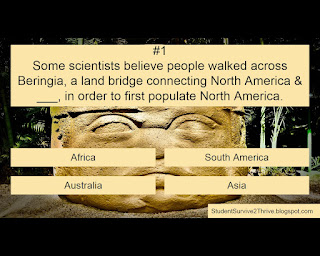 | Some scientists believe people walked across Beringia,
a land bridge connecting North America & ___,
in order to first populate North America.
Answer choices include: Africa, South America, Australia, Asia |
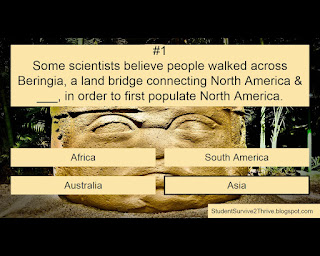 | | The correct answer is Asia. |
 | What crop was probably domesticated by 5000 BCE
& became a major part of the diet for the Olmec population?
Answer choices include: maize, tomatoes, wheat, peanuts |
 | | The correct answer is maize. |
 | Which of the following is/are TRUE of the Olmec society?
Answer choices include:
They devised a calendar to accurately predict eclipses and solstices.
They created the only known written language in the Western Hemisphere of that time.
They produced major works of art, architecture, pottery, and sculptures.
All of these |
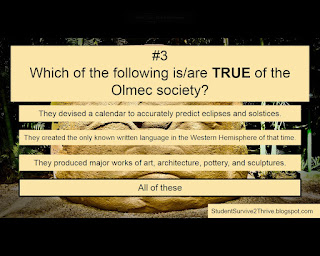 | | The correct answer is all of these. |
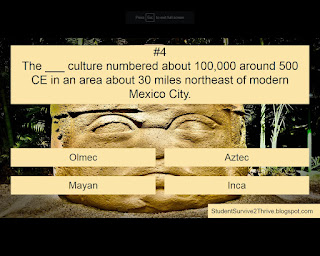 | The ___ culture numbered about 100,000 around 500 CE
in an area about 30 miles northeast of modern Mexico City.
Answer choices include: Olmec, Aztec, Mayan, Inca |
 | | The correct answer is Mayan. |
 | Bishop Landa collected & burned each ___ of the native Mayans.
These were folding history books of glyphs.
Answer choices include: epic poem, codex, scroll, parchment |
 | | The correct answer is codex. |
 | Tenochtitlán was a large, well-planned ancient city
that had ___, or “floating gardens.”
Answer choices include:
chinampas, greenhouses, gondolas, terrariums |
 | | The correct answer is chinampas. |
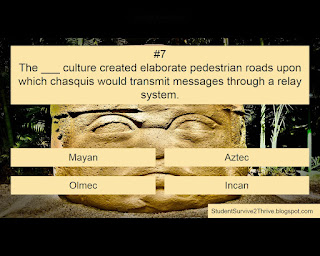 | The ___ culture created elaborate pedestrian roads upon which
chasquis would transmit messages through a relay system.
Answer choices include: Mayan, Aztec, Olmec, Incan |
 | | The correct answer is Incan. |
 | A system of communication utilizing
colored strings and knots is called a ___.
Answer choices include:
papyrus, quipu, 6-string, telegraph |
 | | The correct answer is quipu. |
 | Inca peasants could only keep ⅓ of their crops and were
required to participate in public work called ___ each month.
Answer choices include: pita, lita, mita, dita |
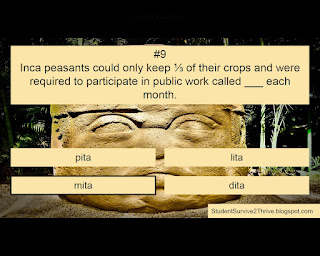 | | The correct answer is mita. |
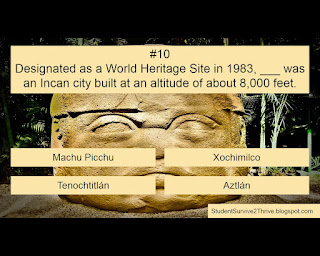 | Designated as a World Heritage Site in 1983, ___ was an Incan city
built at an altitude of about 8,000 feet.
Answer choices include:
Machu Picchu, Xochimilco, Tenochtitlán, Aztlán |
 | | The correct answer is Machu Picchu. |
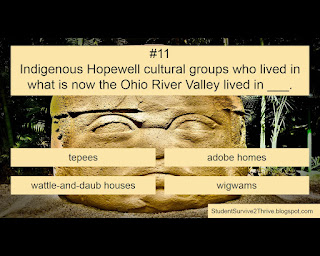 | Indigenous Hopewell cultural groups who lived in
what is now the Ohio River Valley lived in ___.
Answer choices include:
tepees, adobe homes, wattle-and-daub houses, wigwams |
 | | The correct answer is wattle-and-daub houses. |
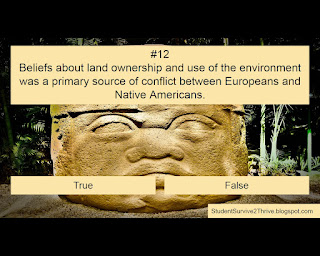 | Beliefs about land ownership and use of the environment was a primary
source of conflict between Europeans and Native Americans.
Answer choices include: true, false |
 | | The correct answer is true. |
 | Two strains of bubonic plague, one transmitted by rats and
the other air-borne, caused massive death & were called the ___.
Answer choices include:
Red Death, Black Death, Blue Death, White Death |
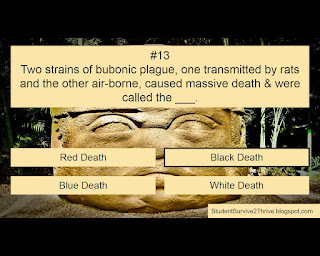 | | The correct answer is Black Death. |
 | In Feudal Europe, __% of the population was made up of serfs,
who were basically bound to the land where
they worked & lived in tough conditions.
Answer choices include: 20, 40, 60, 80 |
 | | The correct answer is 60. |
 | Special Christian church ceremonies, called ___, marked
important moments of life such as birth, maturation, marriage, and burial.
Answer choices include: confessions, sacraments, schisms, pagan holidays |
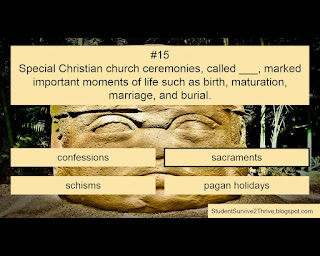 | | The correct answer is sacraments. |
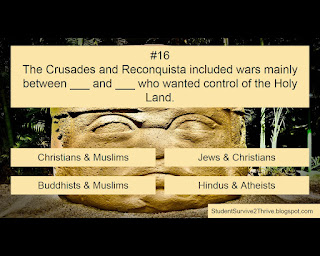 | The Crusades and Reconquista included wars mainly
between ___ and ___ who wanted control of the Holy Land.
Answer choices include:
Christians & Muslims, Jews & Christians,
Buddhists & Muslims, Hindus & Atheists |
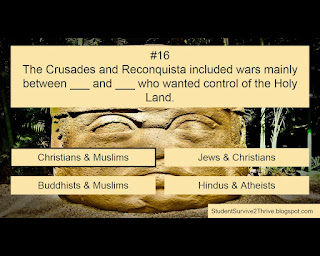 | | The correct answer is Christians & Muslims. |
 | Ruled by Prince Henry with many sites on the African coast,
___ became a leader of exploration and trade in the 1400s.
Answer choices include: Spain, Rome, Greece, Portugal |
 | | The correct answer is Portugal. |
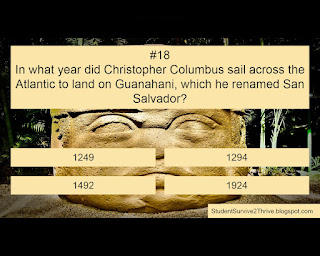 | In what year did Christopher Columbus sail across the Atlantic
to land on Guanahani, which he renamed San Salvador?
Answer choices include: 1249, 1294, 1492, 1924 |
 | | The correct answer is 1492. |
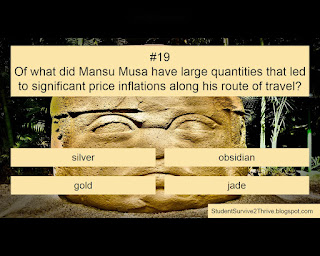 | Of what did Mansu Musa have large quantities that led
to significant price inflations along his route of travel?
Answer choices include: silver, obsidian, gold, jade |
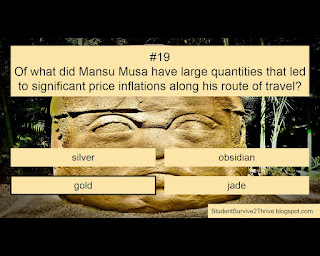 | | The correct answer is gold. |
 | ___ is the idea that people are treated as personal property
that can be bought and sold.
Answer choices include:
Indentured servitude, Chattel slavery, Serfdom, Employment |
 | | The correct answer is Chattel slavery. |
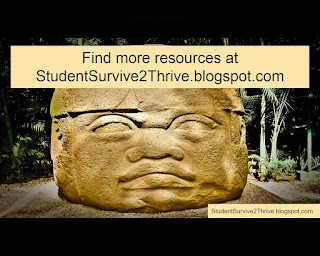 | | Find more resources at StudentSurvive2Thrive.blogspot.com |
|












































No comments:
Post a Comment
Thanks for reading my article and sending your comment! Please note that I do not place links to other web sites on this blog.
Note: Only a member of this blog may post a comment.